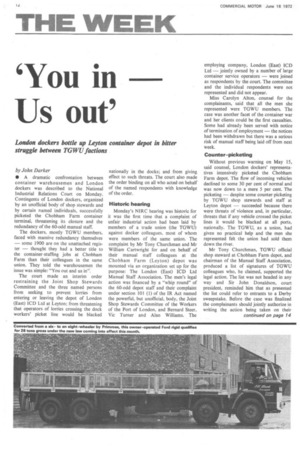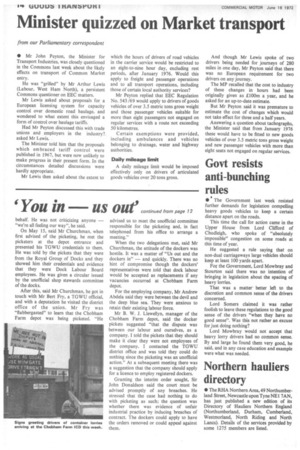'You in -- Us out'
Page 14

Page 16

If you've noticed an error in this article please click here to report it so we can fix it.
London dockers bottle up Leyton container depot in bitter struggle between TGWU factions
by John Darker
• A dramatic confrontation between container warehousemen and London dockers was described to the National Industrial Relations Court on Monday. Contingents of London dockers, organized by an unofficial body of shop stewards and by certain named individuals, successfully picketed the Chobham Farm container terminal, threatening its closure and the redundancy of the 60-odd manual staff.
The dockers, mostly TGWU members, faced with massive redundancy themselves — some 1900 are on the unattached register — thought they had a better title to the container-stuffing jobs at Chobham Farm than their colleagues in the same union. They told the warehousemen the issue was simple: "You out and us in".
The court made an interim order restraining the Joint Shop Stewards Committee and the three named persons from seeking to prevent lorries from entering or leaving the depot of London (East) ICD Ltd at Leyton; from threatening that operators of lorries crossing the dock workers' picket line would be blacked nationally in the docks; and from giving effect to such threats. The court also made the order binding on all who acted on behalf of the named respondents with knowledge of the order.
Historic hearing Monday's NIRC hearing was historic for it was the first time that a complaint of unfair industrial action had been laid by members of a trade union (the TGWU) against docker colleagues, most of whom were members of the same union. The complaint by Mr Tony Churchman and Mr William Cartwright for and on behalf of their manual staff colleagues at the Chobham Farm (Leyton) depot was mounted via an organization set up for the purpose: The London (East) ICD Ltd Manual Staff Association. The men's legal action was financed by a "whip round" of the 60-odd depot staff and their complaint under section 101 (I) of the IR Act named the powerful, but unofficial, body, the Joint Shop Stewards Committee of the Workers of the Port of London, and Bernard Steer, Vic Turner and Alan Williams. The employing company, London (East) ICD Ltd — jointly owned by a number of large container service operators — were joined as respondents by the court. The committee and the individual respondents were not represented and did not appear.
Miss Carolyn Alton, counsel for the complainants, said that all the men she represented were TGWU members. The case was another facet of the container war and her clients could be the first casualties. Some had already been served with notice of termination of employment — the notices had been withdrawn but there was a serious risk of manual staff being laid off from next week.
Counter-picketing Without previous warning on May 15, said counsel, London dockers' representatives intensively picketed the Chobham Farm depot. The flow of incoming vehicles declined to some 30 per cent of normal and was now down to a mere 5 per cent The picketing — despite some counter-picketing by TGWU shop stewards and staff at Leyton depot succeeded because there were threats of violence and, in particular, threats that if any vehicle crossed the picket lines it would be blacked at all ports, nationally. The TGWU, as a union, had given no practical help and the men she represented felt the union had sold them down the river.
Mr Tony Churchman, TGWU official shop steward at Chobham Farm depot, and chairman of the Manual Staff Association, produced a list of signatures of TGWU colleagues who, he claimed, supported the legal action. The list was not headed in any way and Sir John Donaldson, court president, reminded him that as presented the list could refer to entrants to a Derby sweepstake. Before the case was finalized the complainants should jointly authorize in writing the action being taken on their behalf. He was not criticizing anyone — "we're all feeling our way", he said.
On May 15, said Mr Churchman, when first advised of the picketing, he met the picketers at the depot entrance and presented his TGWU credentials to them. He was told by the pickets that they were from the Royal Group of Docks and they showed him their credentials and evidence that they were Dock Labour Board employees. He was given a circular issued by the unofficial shop stewards committee of the docks.
After this, said Mr Churchman, he got in touch with Mr Bert Fry, a TGWU official, and with a deputation he visited the district office of the union. Mr Fry was "flabbergasted" to learn that the Chobham Farm depot was being picketed. "He advised us to meet the unofficial committee responsible for the picketing and, in fact telephoned from his office to arrange a meeting."
When the two delegations met, said Mr Churchman, the attitude of the dockers was hostile. It was a matter of "Us out and the dockers in" — and quickly. There was no hint of compromise though the dockers' representatives were told that dock labour would be accepted as replacements if any vacancies occurred at Chobham Farm depot.
For the employing company, Mr Andrew Abdela said they were between the devil and the deep blue sea. They were anxious to retain their existing labour force.
Mr B. W. J. Llewellyn, manager of the Chobham Farm depot, said the docker pickets suggested "that the dispute was between our labour and ourselves, as a company. I told the pickets that they should make it clear they were not employees of the company. I contacted the TGWU district office and was told they could do nothing since the picketing was an unofficial action." At a subsequent meeting there was a suggestion that the company should apply for a licence to employ registered dockers.
Granting the interim order sought, Sir John Donaldson said the court must be advised promptly of any breaches. He stressed that the case had nothing to do with picketing as such; the question was whether there was evidence of unfair industrial practice by inducing breaches of contract. The dockers could apply to have the orders removed or could appeal against them.




























































































